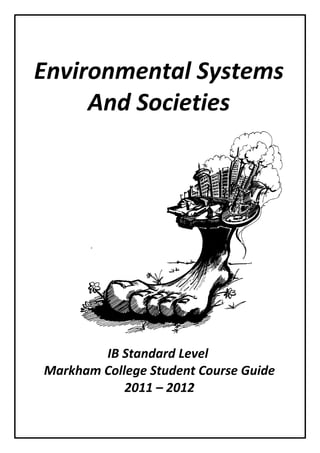
Ess student course guide
- 1. Environmental Systems And Societies I IB Standard Level Markham College Student Course Guide 2011 – 2012
- 2. So what's it all about then? The main purpose of this course is to give you a coherent perspective on the interrelationships between the environment, systems and societies. So what does this mean? It means that we won't just say "here is an environmental problem, isn't it terrible.." To really understand the causes and effects of environmental problems, and how people try to manage them, you will need to look at the issues from many angles (e.g. scientific, ethical, historical, economic, cultural and socio-political). This is called taking a 'holistic' approach. Don't believe people who tell you this is an easy subject, though, studying issues holistically is very complex. This is why the idea of a 'system' is so important in this course. Ecosystems function as a whole and the systems approach shows this. A systems approach is common to many humanities subjects too, like economics, geography, sociology and politics. Environmental Systems and Societies is a transdisciplinary subject (it draws on knowledge, methods and skills from a variety of different disciplines,) so the systems approach is a good way to link these all together. By the end of this course you will be able to adopt an informed personal response to current environmental issues (i.e. know where you stand and why). You will also understand the impact of the choices and decisions you make in your own lives on the environment. Over the next two years you will study a huge range of different ecosystems and environmental issues at many different scales, ranging from in depth studies of local ecosystems, to understanding global management and mismanagement of oceans, tundra, and climate destabilisation. Page 2
- 3. So what will we actually study? Topic 1: Systems and Models Topic 2: The Ecosystem Structure, measuring abiotic and biotic components of the system, biomes, function, changes, measuring changes in the system. Topic 3: Human Population, carrying capacity and resource use Population dynamics, resources—natural capital, energy resources, the soil system, food resources, water resources, limits to growth, environmental demands of human populations. Topic 4: Conservation and biodiversity Biodiversity in ecosystems, evaluating biodiversity and vulnerability, conservation of biodiversity Topic 5: Pollution management Nature of pollution, detection and monitoring of pollution, approaches to pollution management, eutrophication, solid domestic waste, depletion of stratospheric ozone, urban air pollution, acid deposition. Topic 6: The issue of global warming Topic 7: Environmental value systems For a more detailed outline of the course please refer to the Official IB Course Syllabus Page 3
- 4. Aims of the course It is the aim of Environmental Systems to: I provide opportunities for scientific study and creativity within a global context which will stimulate and challenge students s provide a body of knowledge, methods and techniques which characterize environmental systems s enable students to apply and use a body of knowledge, methods and techniques which are characteristic of environmental systems c develop an ability to analyse, evaluate and synthesise scientific information d engender an awareness of the need for, and the value of, effective collaboration and communication during scientific activities c develop experimental and investigative skills d develop and apply the students’ information technology skills in the study of the subject d raise awareness of the moral, ethical, social, economic and environmental implications of using science and technology u develop an appreciation of the possibilities and limitations associated with science and scientists s encourage an understanding of the relationships between scientific disciplines and the overarching nature of the scientific method. Assessment 1. Internal Assessment of written work Internal assessment of theoretical work will occur at teacher discretion. Generally, there will be a short test or quiz every few weeks. You will also be asked to write essays, carry out research assignments and give short presentations. 2. Internal Assessment of practical work The practical scheme of work (PSOW) is the practical course planned by the teacher and acts as a summary of all the investigative activities you carry out throughout your course. Standard level students are required to spend 40 hours on practical activities (excluding time spent writing up work). This must be spread out through the course and written evidence of all this work must be kept in a log-file. Students are entirely responsible for their own work and should accept ownership and take pride in the work they complete. The teacher is required to ensure that all the work submitted is the candidate’s own. If in doubt, authenticity may be checked by one or more of the following methods: a discussion with the student d asking the student to explain the methods used and to summarise the results a asking the student to repeat the investigation. All the practical work reports will be assessed internally by the teacher using the following eight assessment criteria: e planning (a) – Pl(a) p planning (b) – Pl(b) p data collection – DC d data processing and presentation – DPP d conclusion and evaluation – CE c manipulative skills – MS m personal skills (a) – PS(a) p personal skills (b) – PS(b) Each student will be assessed at least twice on each of the eight criteria. The two best marks for each of the criteria are added together to determine the final mark out of 48 for the Internal Assessment (IA) component of the course. This will then be scaled by the external Moderators. Page 4
- 5. Page 5
